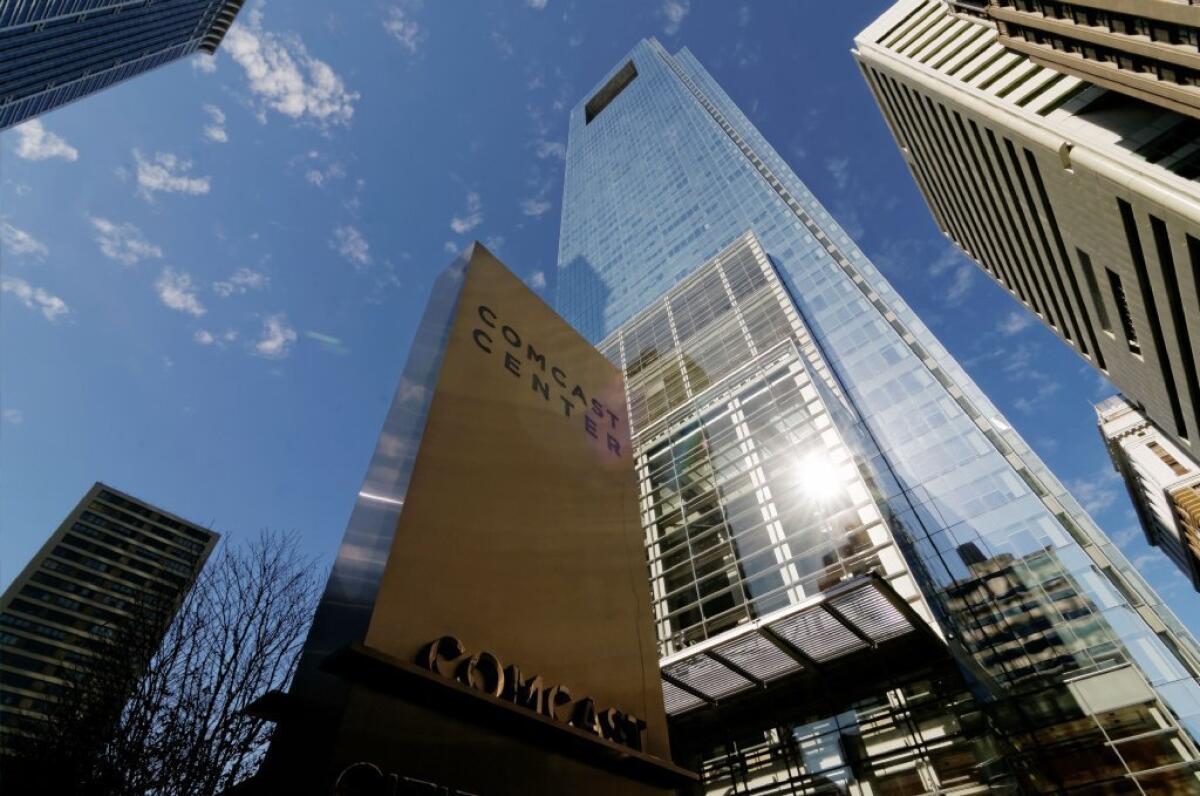Comcast defends Time Warner Cable merger plan in FCC filing

Comcast Corp., already the nation’s largest cable and Internet provider, says it needs to get bigger to compete against the formidable giants of Silicon Valley.
The Philadelphia-based cable behemoth said in a government filing Tuesday that its proposed $40-billion acquisition of Time Warner Cable Inc. will benefit consumers without limiting competition. Both companies contend that they need muscle to compete against emerging competition from Google Inc., Apple Inc., Netflix Inc. and Amazon.com Inc.
Comcast said in a 175-page document filed with the Federal Communications Commission that the deal would mean better Internet and cable TV service for millions of consumers. Top executives from the two companies were expected to appear Wednesday before the Senate Judiciary Committee to address concerns that the acquisition would stifle Internet and video competition.
FACES TO WATCH 2014: Digital media
“There’s been a lot of discussion about whether big is bad, and sometimes when companies join together, big can be dangerous,” David Cohen, Comcast’s executive vice president, said in a conference call with reporters Tuesday. “With this particular transaction, we think big is very good in many respects.”
Unveiled in February, Comcast’s proposed purchase of Time Warner Cable would create a media colossus that would serve 30% of the nation’s cable TV households and about 40% of homes that have broadband Internet service. Much of that heft would be concentrated in the nation’s largest cities, including Los Angeles, New York and Chicago.
The combined company also would control many of the nation’s top entertainment outlets. Comcast already owns Universal Studios and such TV networks as NBC, MSNBC, CNBC, Golf Channel and USA as well as local sports channels in Philadelphia and Chicago. Time Warner Cable owns local sports and news channels including New York 1 and SportsNet in Los Angeles, which carries Lakers games.
Comcast executives have stressed that the combination would not harm competition — or consumers — because the two companies currently do not provide service in the same geographic locations. Comcast would still face the same level of competition and consumers would still have the same number of choices, the companies said.
But consumer groups and media watchdogs fear that the deal would consolidate too much power in the hands of one company.
PHOTOS: Top 10 gadgets we want to see this year
“This merger would give Comcast the incentive and ability to stifle competition, thwart innovation from online services and impose higher costs on rival video and online services, which will eventually be paid for by consumers,” warned Gene Kimmelman, president of the media reform group Public Knowledge and a former chief counsel at the Justice Department. Kimmelman also was scheduled to testify before the Senate panel.
Comcast and Time Warner Cable’s filing is the first phase of their campaign to get their deal approved by federal regulators. The FCC must determine whether the merger serves the public interest. Separately, the Justice Department plans to conduct an antitrust review to make sure the merger would not diminish or harm competition.
Experts say they expect the federal review to delve into issues involving the Internet, including connections between Internet traffic providers. Because the merged entity would become one of the nation’s largest broadband providers, there is a concern that such a scenario could lead to abuses of power.
For example, Internet rights activists worry that Comcast could slow Internet speeds and quality to gain leverage in negotiations with other companies.
Comcast counters that it is the only company still abiding by the FCC’s open Internet or net neutrality rules, which mandate that all Internet traffic be treated equally, even though those regulations were recently tossed by a federal court.
ON LOCATION: Where the cameras roll
Some consumer groups also express concerns that Comcast could charge hefty tolls to allow video services and third-party traffic providers to reach the company’s Internet customers. Comcast has said such deals do not fall under net neutrality rules.
Of particular concern to Comcast is Google, the Internet giant building its own super-high-speed broadband service that competes against cable and telephone companies. Google was mentioned more than a dozen times in Comcast’s FCC filing.
“Google is coming,” Cohen said in the conference call. “They are a company with global scale, and they are much larger than we are. We also need scale to compete with the Googles and other generations of competitors.”
Google Fiber, the company’s broadband offering, is available in Kansas City, Mo., and Kansas City, Kan., and is rolling out in Austin, Texas, and Provo, Utah. Google this year identified a handful of potential new markets, including San Jose and Phoenix.
Los Angeles isn’t in Google’s coverage plans, but city officials this week unveiled a plan to solicit information from companies interested in improving Internet service in the area.
A Google spokesperson declined to comment on Comcast’s filing.
PHOTOS: Box office top 10 of 2013 | Biggest flops of 2013
Comcast and Time Warner Cable also argued that Netflix, Apple and other creators and distributors of content are growing at a rapid rate and are evidence of a vast array of consumer choices now available. Those firms would not be adversely affected by their merger, the companies said.
“In the evolving video marketplace in which these companies have thrived, there is no reason why a cable company should be limited in evolving as well,” Comcast and Time Warner Cable said in their filing.
Comcast’s Cohen has said cable bills would not go down as a result of this deal, but he also touted significant improvements in service. Comcast offers higher capacity, faster Internet speeds and more Wi-Fi hot spots than Time Warner Cable. It also has a more robust video-on-demand library of movies and TV shows — nearly three times the size of Time Warner Cable’s offerings — which would give customers access to more entertainment options.
Comcast has promised to extend its Internet Essentials program, which provides modestly priced Internet service to low-income families, to Los Angeles and other markets served by Time Warner Cable.
Comcast executives have said they hope that the deal could be approved by the end of the year.
More to Read
From the Oscars to the Emmys.
Get the Envelope newsletter for exclusive awards season coverage, behind-the-scenes stories from the Envelope podcast and columnist Glenn Whipp’s must-read analysis.
You may occasionally receive promotional content from the Los Angeles Times.












